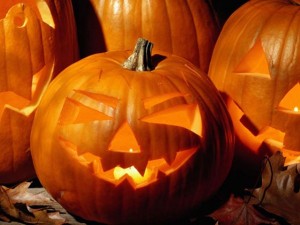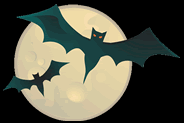The Origins of Halloween
Halloween takes place on Allhallows Eve, on October 31st. It is considered as a children’s holiday. It is the feast of the souls and ghosts.
Halloween is a shorter form of All-Hallow-Eve, the eve of All Saints’ (since hallows comes from holy which means saint). In the old Celtic calendar the year began on November 1st, so that the last evening of October was “old-year’s night”. On this last night of October, the Celtic Druids also celebrated the day of Saman, or the end of the summer, when the Lord of Death called together the souls of the wicked who had died during the past year. Families would leave their doors open and set out food and drinks for the spirits.
People expected the witches, goblins and other mischievous beings to come, and they danced around bonfires in the hope of keeping them away, while asking the Sun to never stop burning. Even though Saman was a night of spriritual apprehension and danger, it was also a night where people tried to predict the future, tried to reveal who would marry, be successful or die. In the IXth century, the Church christianized the Celtic New Year into “All Hallows”.
The custom crossed the Atlantic Ocean with the pilgrims, and was enforced with the Irish immigrants in the XIXth century. In fact, the American “Jack-o’-lanterns” created with the New World’s pumkins replaced the Irish “Jack-o’-lanterns” cut into the turnips. The turnips, like the pumkins, were hollowed out and a candle was lit inside them. In the Irish tradition, a certain Jack wanders between heaven and hell with a lantern lit by glowing embers thrown by Satan.
Today, all the young children disguise themselves as ghosts or witches and knock on people’s doors. They say to them “Trick or Treat” : if the person says “treat”, they will give the children a treat (eg sweets, fruit, drinks, some money perhaps), but if they say “trick”, then that means that they refuse to give them a treat and the children therefore play a trick on them.
Bibliography : Les Etats-Unis, Larousse The Oxford English Dictionary Rites et Traditions de par le Monde, Time-Life Grand Dictionnaire Encyclopédique Larousse


